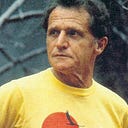The Continuing Story
Jan. 9, 2022 — The first week of January is a busy week for Japanese road racing scene. There is All Japan Corporate Team Ekiden Championships (men’s) on January 1st. Famous collegiate Hakone Ekiden road relay will be contested 2nd and 3rd of January. Hakone Ekiden has become one of the most popular running event among the running-crazy Japanese TV viewers. Over 217.1km (=135.7 miles) divided into 10 legs run over 2-days; this footrace is covered on TV nearly 6-hours each day and the rating is whopping 28%! This year, Aoyama-Gakuin University won for the 6th time in the past 8 years. In 2016, Aoyama-Gakuin University won Hakone Ekiden for the second time. Then I received a book from my good friend, the former Japanese national marathon record (2:06:16) holder, Toshinari Takaoka. It was a book written by (a ghost-writer of, I’m sure…) Susumu Hara, the head-coach of Aoyama Gakuin University ekiden team. “I think you’ll find this interesting…” Toshi says. There was a post-it on page 154. Over 3-pages, Coach Hara is talking about none other than Lydiard training method.
Susumu Hara was a young promising runner in high school; not so much at college but good enough to join Team Chugoku Electronics under the guidance of Coach Yasushi Sakaguchi. Sakaguchi was a good runner at Waseda University where the legendary Japanese marathon runner, Toshihiko Seko was also attending. They both were coached by Coach Kiyoshi Nakamura. Nakamura was one of the first coaches to bring the Lydiardism to Japan (story HERE). Sakaguchi, along with his teammate, Seko, moved on to S&B (manufacturer of spices) corporate running team and continued to be under the influence of Coach Nakamura. Sakaguchi had some heart problem (irregular heart beat) and retired from competition prematurely; but he went on to become the head coach at Chugoku Electronics running team in 1992. He quickly became one of the best marathon coaches in Japan by developing 5 sub-2:10 runners including Shigeru Aburaya (5th at 2004 Athens Olympics marathon), Tsuyoshi Ogata (bronze medal at 2005 Helsinki World Championships marathon) and Atsushi Sato (6th at 2009 Berlin World Championships marathon). Chugoku Electronics team won the New Year Ekiden in 2004, 12 years after he became its head coach.
Susumu Hara ran for Chugoku Electronics between 1992 to 1995. He was the team captain in 1993; but, as an athlete, he didn’t quite fulfill his dream. But Coach Sakaguchi’s training philosophy, a la Lydiard, left quite an impression. He was invited to coach Aoyama-Gakuin University running team in 2004. Aoyama-Gakuen University (fondly known by Japanese as “Ao-Gaku”) had an okay running team….before. But they had “the longest ‘blank’ in Hakone Ekiden history. But Coach Hara led the new team to Hakone Ekiden first time in 33 years in 2009 and took the 22nd place. And in 2015, 11 years after Hara started coaching, Ao-Gaku took the first victory at Hakone Ekiden. In this book, Coach Hara says, of Lydiard training: “Lydiard book (Japanese translation of ‘Running with Lydiard’) was the treasure at Chugoku Electronics running team. Its training philosophy was brought to Japan in early 1960s (by Kiyoshi Nakamura) and gave tremendous influence to the legend, Toshihiko Seko. And his teammate, Sakaguchi-san brought to Chugoku Electronics…”. “This book, along with Seko’s book, ‘Fundamentals of Marathoning’, which is also based on the Lydiard Principles, are two of my Bibles…”.
Another interesting thing in this book is something I always say — delivery of the message. The perfect training method is nothing if your delivery is not good. Lydiard said: “You can’t test ‘motivation’. Knowledge is nothing if you can’t motivate athletes…”. Coach Hara says, the advantage of Lydiard training system is that the purpose and the objective are all clear. And the effectiveness of the system is proven with many champions in the past; Seko included. “When young teenage runners come to Ao-Gaku team, I explain to them, step-by-step, why Lydiard training works and who has employed it and succeeded…. It is very straight-forward,” says Coach Hara. Again, Lydiard: “It is no good just telling runners WHAT to do and HOW to do it; but you also need to explain WHY they are doing that workout…”. “Lydiardism” is still alive and going strong in Japan with Coach Susumu Hara and young runners at Aoyama-Gakuin University running team, via Kiyoshi Nakamura and via Yasushi Sakaguchi. — Nobby Hashizume
